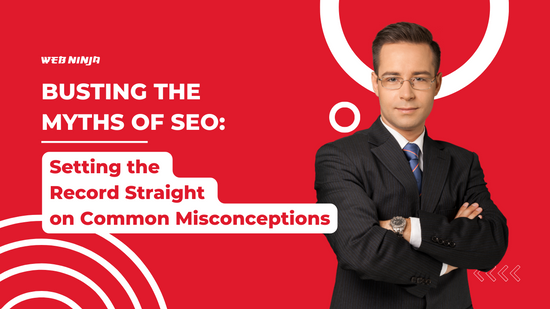Busting the Myths of SEO: Setting the Record Straight on Common Misconceptions
Search Engine Optimization (SEO) is a constantly evolving field and there are many misconceptions surrounding it. From thinking that SEO is only about keywords to believing that SEO is dead, there are many misconceptions that can lead to confusion and frustration for those trying to optimize their website.
In this article, we will explore some of the most common misconceptions about SEO and clear up any confusion.
1. SEO is About Gaming the System
While some questionable tactics may temporarily improve a website's search engine rankings, the long-term success of a website depends on its relevance and usefulness to users.
Search engines constantly update their algorithms to reward websites that provide the best user experience and penalize those that do not.
2. Keyword Stuffing is Effective
What is Keyword Stuffing?
Keyword stuffing is the practice of overloading a webpage with a large number of keywords in an attempt to manipulate search engine rankings. It involves the repetition of keywords or phrases in the content of a webpage in an unnatural way in an attempt to rank higher for those keywords.
In the past, keyword stuffing was a common tactic used by some websites to try to improve their search engine rankings. However, search engines have become more sophisticated and now prioritize content that is relevant and well-written, rather than content that is just stuffed with keywords.
Keyword stuffing can actually hurt a website's search engine rankings because it can make the content difficult to read and understand for users. It can also lead to penalties from search engines if they determine that the website is engaging in manipulative tactics.
Instead of keyword stuffing, it's important to focus on creating high-quality content that is relevant to your target audience and addresses their needs and interests. Using relevant keywords in a natural and appropriate way can help improve a website's search engine rankings, but it's important not to overdo it.
To prevent employing alternative methods that could harm your website's performance and hinder its ranking in search engine results pages (SERPs), it is advisable to refer to Google’s Spam Policies for web search. By doing so, you can ensure that your website adheres to the guidelines provided by Google and avoids any practices that may be considered spammy or detrimental to its visibility.
3. Meta Tags are The Most Important Factor for SEO
What are Meta Tags?
Meta tags are snippets of HTML code that provide information about a webpage. They are placed in the head section of the HTML code for a webpage and are not visible to users when they visit the webpage.
There are several types of meta tags, including:
- Title tags: The title tag is the most important meta tag and is used to specify the title of a webpage. The title appears in the browser tab and is also used by search engines as the title of the search result.
- Meta descriptions: The meta description is a short summary of the content of a webpage. It is often displayed in search engine results below the title and can be used by search engines to determine the relevance of a webpage to a particular search query.
- Meta keywords: The meta keywords tag is used to specify a list of keywords related to the content of a webpage. However, this tag is not used by most search engines and is generally not considered to be an important factor in SEO.
Meta tags can be an important factor in SEO because they provide information about a webpage to search engines and can help determine its relevance to particular search queries.
However, they are just one piece of the puzzle and other factors such as website structure, content quality, and backlinks are also important for search engine rankings.
While meta tags can be an important factor in SEO, they are just one piece of the puzzle. Other factors such as website structure, content quality, and backlinks are also important for search engine rankings.
4. More Backlinks are Always Better
What are backlinks?
Backlinks are links from other websites to your website. They are also known as "inbound links" or "external links." Backlinks are an important factor in search engine optimization (SEO) because they can help search engines determine the quality and relevance of your website.
When a website links to another website, it's essentially giving a "vote of confidence" to that website. Search engines view backlinks as a way to measure the popularity and authority of a website.
In general, the more backlinks a website has from reputable sources, the higher it will rank in search engine results.
There are a number of ways to acquire backlinks for your website, including:
- Creating high-quality content that other websites will want to link to.
- Participating in online communities and forums related to your industry.
- Guest blogging on other websites.
- Promoting your website through social media and other online channels.
However, while backlinks as mentioned is an important factor in SEO, the quality of the backlinks is more important than the quantity. Having a few high-quality backlinks from reputable websites can be more effective than having a large number of low-quality backlinks.
5. SEO is a one-time thing
SEO is an ongoing process that requires constant attention and optimization to maintain and improve a website's search engine rankings. Search engines constantly update their algorithms and the factors they consider when ranking websites, so it's important to stay up-to-date and make sure your website is optimized for the most current best practices.
Key Factors to Consider When Optimizing a Website
- On-page Optimization
This involves optimizing the content and structure of your website to make it more search-engine friendly. This includes things like using descriptive and relevant titles and headings, optimizing images and videos with alt tags, and using header tags to break up long blocks of text.
- Off-page Optimization
This involves building high-quality backlinks from other reputable websites, as well as promoting your website through social media and other channels.
- Content Quality
Search engines prioritize websites that provide valuable, informative, and well-written content to users. It's important to regularly publish high-quality content that is relevant to your audience and addresses their needs and interests.
- Technical Factors
There are also a number of technical factors that can impact a website's search engine rankings, such as the speed at which the website loads, its mobile-friendliness, and its overall security. It's important to ensure that your website is optimized for these technical factors to improve its search engine rankings.
Conclusions
In conclusion, SEO is a dynamic and ever-evolving field with various misconceptions that can cause confusion. We have debunked common myths surrounding SEO, including the belief that it revolves around gaming the system or keyword stuffing. Instead, the long-term success of a website depends on its relevance and usefulness to users, as search engines prioritize content quality and user experience.
While meta tags are important for providing information to search engines, they are just one piece of the SEO puzzle. Website structure, content quality, and backlinks are also crucial factors in search engine rankings. When it comes to backlinks, it's not about quantity but rather the quality and relevance of the links.
Furthermore, SEO is not a one-time task but an ongoing process that requires constant attention and adaptation to stay aligned with search engine algorithms. On-page optimization, off-page optimization, content quality, and technical factors all play a role in optimizing a website for better search engine rankings.
At Web Ninja, we understand the true essence of SEO and can guide you through the intricacies of optimizing your website. Partner with us to harness the power of SEO, attract targeted traffic, and boost conversions. Take the first step towards dominating the search engine results pages (SERPs) by contacting us now for a personalized consultation. Success awaits—seize it with Web Ninja!
Other Web Ninja Blogs
-
-
by Jeffrey Almarez | September 16, 2022 Read More
-





